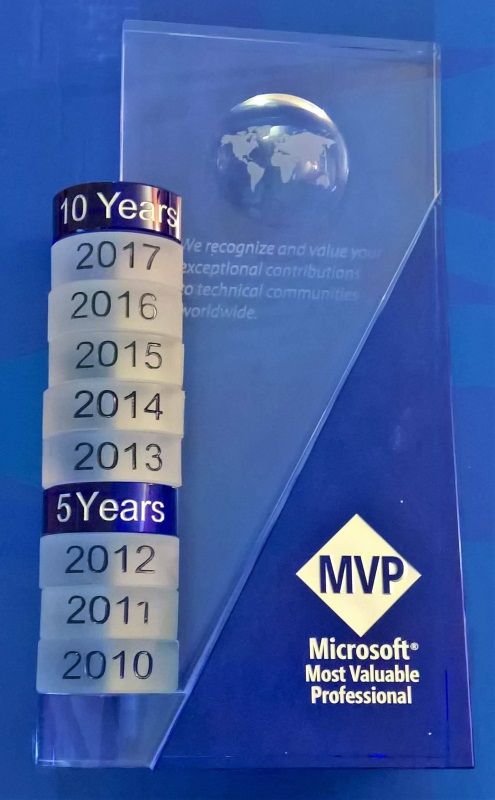On Being An MVP
- 5 minutes to read
- edit
In January of this year, I was reawarded as A Microsoft MVP, marking 10 years as an MVP.

Over that time, I’ve seen a tremendous amount of changes in technology but also in the award program itself.
I was first awarded in January 2008 in the “Visual Developer - Visual C#” category. Today, I’m in the “Visual Studio and Development Technologies” category. Nothing has actually changed for me in that regard, other than having my category go through a couple of renames. Overall, for Developer and IT Pro MVPs, the program has moved from 36 areas of technical expertise to just 10 broad categories that cover a combined set of 90 different technology areas, including open source contributions. The program has also changed departments since I started and I’ve gone from a category focused “MVP Lead” (a sort of liason between me and Microsoft) based out of Redmond to a regional one.
Over the years, I’ve had people ask how I became an MVP and what being an MVP means to me. I never set out to become an MVP. I was aware of the MVP program and what it meant, but never thought about becoming one myself. In 2006, I was very active online in discussion forums, blogging, and writing some online articles. That activity caught the eye of the person who would become my first MVP lead and he submitted me as a candidate. At that time, MVPs were awarded every quarter as opposed to every month, and I went through 3 different award cycles before I was finally awarded. I needed more offline experience, public speaking and “real life” community exposure before I was awarded. Each year, I to continue my activites in order to be renewed for the following year. Over time, I’ve moved focus around a bit and in some years I do more “up front” out-in-the-open community focused work while in others I’ve done more “back end” behind-the-scenes work. In both cases, though, the impact to the community is what counts as contributions towards my reaward.
So, now that I’ve been an MVP for 10 years, what does it mean to me? To ask it another way, what are the benefits of being an MVP? From Microsoft’s point of view, being an MVP means that they’re recognizing me for my contributions to the Microsoft developer community and to the Microsoft developer products/languages. For me, simply put, it means that I have direct access to the product groups within Microsoft and can help influence those products. I get to go to Redmond once a year for the MVP Summit. To me, that’s propbably the single biggest benefit to being in the program. I get to spend about 4 days on the Microsoft campus directly talking to the language designers about new language features, discussing syntax, and helping to set priorities. These conversations are incredible, but they don’t stop once we leave campus. There are numerous private mailing lists that we can subscribe to that are active all year long. In addition to that, we have regular calls with different product groups to keep up to date with what’s going on. Typically, although not always, we know about things well in advance but due to very strict NDAs can’t talk about it until it’s been made public knowledge.
Not only does Summit allow me to connect (and reconnect) with the produt teams, it’s a great networking opportunity as well. There are other MVPs that I’ve gotten to know over the years that I only see once a year at Summit. There are others that I’ve know online for a while and Summit is the first time meeting them in person. It’s a great experience and one that, even now, can sometimes be overwhelming.
There are other benefits as well, such as an MSDN subscription, Azure credits, licenses for developer tools, and other things, but they don’t compare to the unfettered access to the product teams.
I look forward to another 10 years in the program, which of course means that I have to keep up my community involvement, and seeing what else changes during that time.